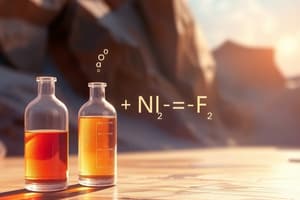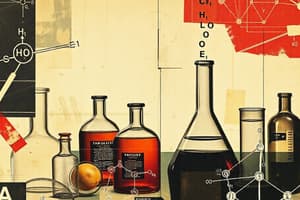Podcast
Questions and Answers
What is the formula weight of NaOH?
What is the formula weight of NaOH?
- 23 g
- 40 g (correct)
- 36 g
- 30 g
Why is the formula weight of NaCl not considered a molecular weight?
Why is the formula weight of NaCl not considered a molecular weight?
- NaCl is a solid at room temperature.
- It is too heavy to be a molecular weight.
- It is not derived from atomic weights.
- Molecules of NaCl do not exist since it is an ionic compound. (correct)
Which step is NOT part of deriving an empirical formula?
Which step is NOT part of deriving an empirical formula?
- Divide by the smallest mole value.
- Determine the percentage of each element. (correct)
- Multiply to obtain whole numbers if necessary.
- Convert grams to moles.
What mass does one mole of H2O have?
What mass does one mole of H2O have?
Given 43.6% P and 56.4% O in a compound, what is the first step to find the empirical formula?
Given 43.6% P and 56.4% O in a compound, what is the first step to find the empirical formula?
What does stoichiometry primarily deal with in chemical reactions?
What does stoichiometry primarily deal with in chemical reactions?
Which principle postulate distinguishes Dalton's atomic theory from earlier beliefs about matter?
Which principle postulate distinguishes Dalton's atomic theory from earlier beliefs about matter?
What does the law of conservation of mass state?
What does the law of conservation of mass state?
According to Dalton's theory, what causes a pure compound to maintain consistent proportions?
According to Dalton's theory, what causes a pure compound to maintain consistent proportions?
What is the concept of the law of multiple proportions?
What is the concept of the law of multiple proportions?
Flashcards
Formula Weight
Formula Weight
The sum of the atomic weights of all atoms in a chemical formula.
Molecular Weight
Molecular Weight
The sum of the atomic weights of all atoms in a molecule.
Empirical Formula
Empirical Formula
The simplest whole-number ratio of atoms of each element in a compound.
Mole
Mole
Signup and view all the flashcards
Deriving Empirical Formula
Deriving Empirical Formula
Signup and view all the flashcards
Stoichiometry
Stoichiometry
Signup and view all the flashcards
Dalton's Atomic Theory
Dalton's Atomic Theory
Signup and view all the flashcards
Law of Conservation of Mass
Law of Conservation of Mass
Signup and view all the flashcards
Law of Definite Proportions
Law of Definite Proportions
Signup and view all the flashcards
Isotopes
Isotopes
Signup and view all the flashcards



